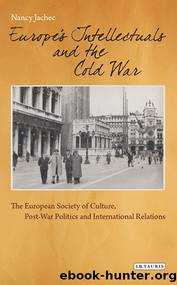Europe's Intellectuals and the Cold War: The European Society of Culture, Post-War Politics and International Relations by Nancy Jachec

Author:Nancy Jachec [Jachec, Nancy]
Language: eng
Format: epub
Tags: International Relations, Philosophy, European, Diplomacy, Europe, Modern, Literary Criticism, Semiotics & Theory, 20th Century, Political Science, World, History, General, History & Surveys
ISBN: 9780857738424
Google: GROJDwAAQBAJ
Goodreads: 26491108
Publisher: I.B. Tauris
Published: 2015-07-31T00:00:00+00:00
CHAPTER 7
RETURNING TO EUROPE: REFORM COMMUNISM, MARXIST HUMANISM AND THE EARLY HUMAN RIGHTS MOVEMENT IN EASTERN EUROPE IN THE 1960s
Campagnolo had intended the âCulturalist Manifestoâ to be a blueprint for an organization that would be more public, more political, and more global in its reach than the SEC had so far been.1 Yet it turned out to be more of a personal turning point for him than for the Society as a whole. As we have seen, the manifesto was generally considered to be unrealistic, and its global aspirations had dire consequences for the relationship between the SEC and many of Francophone Africaâs leading intellectuals. For many members, the Societyâs tenth anniversary, for which it had been written, should instead have been an opportunity to reaffirm the SECâs original purpose of European détente. Consequently, much of the opposition to the manifesto came from the Italian communists in the audience â Aldo Dami, Donini and Terracini, and from members from Europeâs socialist states, Mirko DeanoviÄ, Ehrenburg, Vladimir Georgiev, Miroslav MÃÄko, Jan Parandowski and MichaÅ Rusinek â all of whom called for the Society to renew its original commitment to promoting dialogue between Eastern and Western Europe.2 Apart from enabling the SEC to build on its achievements in the area where it had already been most successful, such a move would have helped it to maintain its position in a field that would soon be crowded with other organizations concerned with EastâWest dialogue. Throughout the 1960s, initiatives by various Catholic and secular organizations would bring intellectuals from across Europe together on a fairly regular basis. Frequently addressing the question of cultural and human rights in the aftermath of the war, these meetings, no less than the SECâs, provided opportunities for figures from Europeâs socialist countries to stay involved in the emerging discussion in the West around those issues, to âreturn to Europeâ, as the historian Vladimir Kusin has described it, on a cultural and moral basis. With hindsight, these were early steps toward the de-Stalinization and the democratization of those countriesâ socialist political systems.3
There was, however, a more pragmatic thread in the âCulturalist Manifestoâ that assumed greater importance for the evolution of the Society in the field of EastâWest exchanges in the 1960s, and it was picked up by the same constituency in the SEC that had been most critical of the manifesto: the idea of democracy as the most suitable vehicle for pursuing the SECâs aims in the new decade. In the manifesto, Campagnolo had named democracy as the best political system for resolving the international problem. Not only was it the âmost widespreadâ political regime, and one in which public opinion could easily be influenced, it seemed to lend itself, he suggested, to the natural will among peoples against war and toward peace.4 He returned to this theme again in another essay of the same year, âNot Everybody can be a Marxistâ. As we have already seen, Sartreâs essay had helped him to identify the individual as the maker of history, as the creative agent capable of structuring a socialism based foremost on social justice.
Download
This site does not store any files on its server. We only index and link to content provided by other sites. Please contact the content providers to delete copyright contents if any and email us, we'll remove relevant links or contents immediately.
What's Done in Darkness by Kayla Perrin(26593)
The Fifty Shades Trilogy & Grey by E L James(19079)
Shot Through the Heart: DI Grace Fisher 2 by Isabelle Grey(19058)
Shot Through the Heart by Mercy Celeste(18936)
Wolf & Parchment: New Theory Spice & Wolf, Vol. 10 by Isuna Hasekura and Jyuu Ayakura(17112)
Python GUI Applications using PyQt5 : The hands-on guide to build apps with Python by Verdugo Leire(16994)
Peren F. Statistics for Business and Economics...Essential Formulas 3ed 2025 by Unknown(16878)
Wolf & Parchment: New Theory Spice & Wolf, Vol. 03 by Isuna Hasekura and Jyuu Ayakura & Jyuu Ayakura(16825)
Wolf & Parchment: New Theory Spice & Wolf, Vol. 01 by Isuna Hasekura and Jyuu Ayakura & Jyuu Ayakura(16447)
The Subtle Art of Not Giving a F*ck by Mark Manson(14353)
The 3rd Cycle of the Betrayed Series Collection: Extremely Controversial Historical Thrillers (Betrayed Series Boxed set) by McCray Carolyn(14140)
Stepbrother Stories 2 - 21 Taboo Story Collection (Brother Sister Stepbrother Stepsister Taboo Pseudo Incest Family Virgin Creampie Pregnant Forced Pregnancy Breeding) by Roxi Harding(13645)
Scorched Earth by Nick Kyme(12771)
Drei Generationen auf dem Jakobsweg by Stein Pia(10965)
Suna by Ziefle Pia(10889)
Scythe by Neal Shusterman(10337)
International Relations from the Global South; Worlds of Difference; First Edition by Arlene B. Tickner & Karen Smith(9522)
The Ultimate Python Exercise Book: 700 Practical Exercises for Beginners with Quiz Questions by Copy(9506)
D:\Jan\FTP\HOL\Work\Alien Breed - Tower Assault CD32 Alien Breed II - The Horror Continues Manual 1.jpg by PDFCreator(9489)
